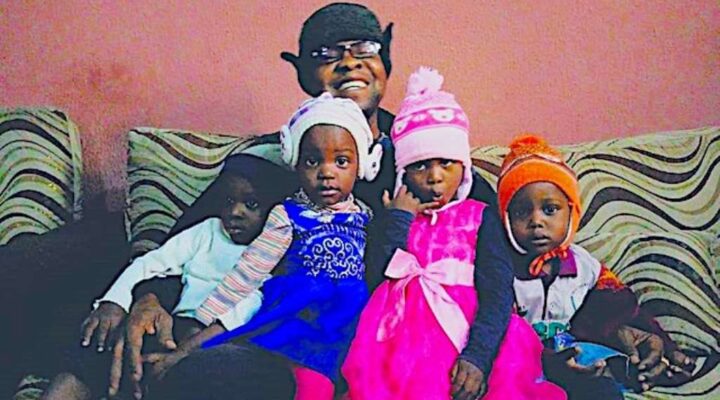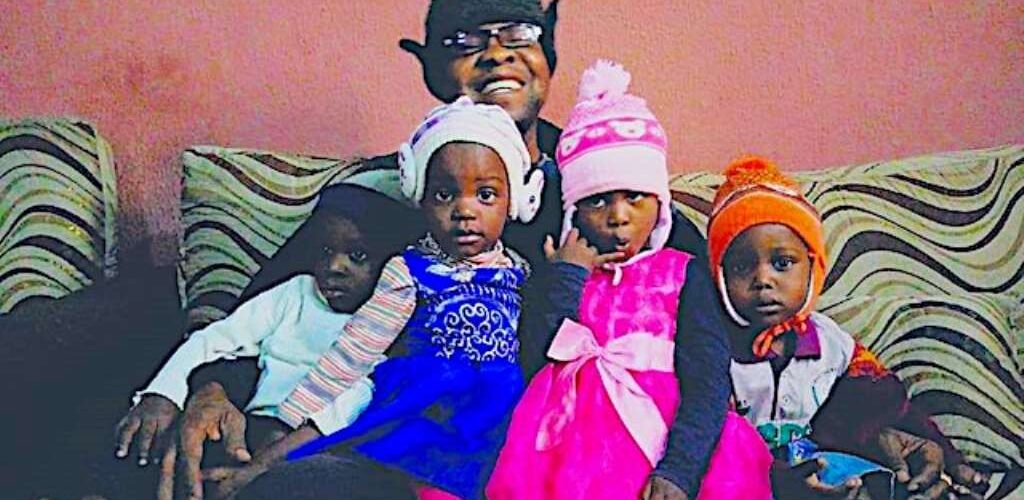In terms of paying a price for one’s work or commitment, Solomon Musa Tarfa has seen and experienced a lot.
Starting off as an evangelical worker for a U.S. faith organization in his native Nigeria — which involved teaching the Bible to people in parts of the predominantly Muslim north — Tarfa and his wife later decided to set up an orphanage.
At Du Merci Center, children facing rejection are welcomed and cared for.
Things seemed to be going well for the orphanage until law enforcement officials in Kano State, where one of the orphanages is based, took more than a passing interest in its work and chose to take action against it. In December 2019, security officials stormed Du Merci orphanage and forcefully took away 19 children. Six days later, they headed for nearby Kaduna State where Du Merci had an office and removed eight children from the center.
The children from both raided orphanages were transferred to another orphanage operated by the Kano State government, from where some of them were moved elsewhere.
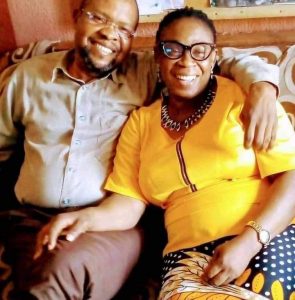
Solomon Musa Tarfa and his wife
Tarfa was accused of operating an unlicensed orphanage and trafficking in children, charged to court and put behind bars. He denies all charges.
“The attorney general (of Kano State) allocated the case to one high court judge. We were there and Aliero (judge) discharged me from the two charges of kidnapping, abduction before they now falsely accused me of falsifying a certificate which was not true,” he said during an interview with Baptist News Global from his Kano base July 22.
He added: “I got it (certificate) through due process. If they knew the certificate was false, they would have called the woman who issued it, but they instead went and called the bank. The bank may not know why I paid the money to her account. It’s the woman who knows why she gave me the certificate. And the person who brought the certificate is her worker. And I signed a ledger in their office showing that I received the certificate. So let them bring the ledger out. If the certificate is not genuine, she wouldn’t have given me the ledger to sign.”
Apart from the reputational damage to Du Merci orphanage by the actions of the Kano and Kaduna state governments, Tarfa spent nearly two years in detention over the course of two arrests.
“I was in prison for one year before I was taken back to prison after being sentenced again. I came out from the second jail term on Jan. 27 this year,” he explained. “This was a jail term. The first time, they just kept me there while the case was going on. I have spent approximately two years in detention.”
On one of the times, he said, he was released only when a good-spirited woman met a huge bail condition set by the court.
Despite what Tarfa and his wife and children have endured, he said he would not close down the center.
After Du Merci orphanage’s demolition in Kaduna State, Tarfa’s family relocated to Jos, Plateau State, in the same northern region, to continue their humanitarian work. But he said it has not been easy operating the orphanage in their new location alongside that of Kano, due to, as he put it, the “persecution” they faced over time and the image problem it created in the minds of people.
While a recent election in Nigeria saw to the exit of the Kano governor, Abdullahi Umar Ganduje, and his officials, Tarfa said he and his lawyers are working to contact the new governor to press for, among others, the release of the children taken from Du Merci orphanages in both Kaduna and Kano who still remain in the state government’s custody despite all attempts to have them back.
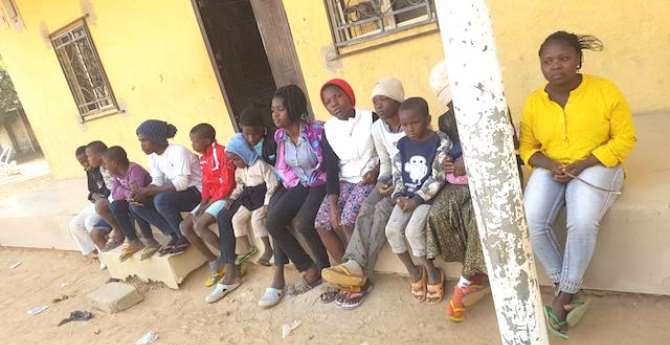
Children from the Du Merci orphanage at the state-run facility.
Of the 27 wards initially taken away, Tarfa said that state officials returned eight through the Christian Association of Nigeria, abandoned two in hospital while one was sent away as she was deemed too protective of her siblings or stubborn.
Tarfa is sending a letter to the new governor, he said. “I’m going to copy the women affairs commissioner and CAN, so that CAN can follow it up. CAN promised to follow the children to release.”
Tarfa spoke about this and other issues in the interview, excerpted below.
In March last year when Baptist News Global did a story about your orphanage, I contacted the Kano State commissioner for women affairs and social development, Zahrau Muhammad Umar, who said the issue was beyond her and then referred me to the state’s attorney general and commissioner of justice, Musa Abdullahi Lawan. The attorney general talked about the situation concerning you. Can you give us a background to what led to your orphanage being (raided)?
For the women affairs commissioner to tell you the case is beyond her power (was an attempt to deceive). The fact is, the case had been judged, I had been exonerated and the court had ordered her to return the children. The commissioner had been holding the children. It’s between the state and her and she’s responsible. Right now, she no longer occupies the position, but our lawyer has taken the matter to court again.
The children were actually held by her because she had an agenda. She transferred five minors from the orphanage and Islamized them because she had an agenda. The children were mixed. Some of them came from the Kaduna orphanage, others from the Kano orphanage. Now the minors among them don’t even know their own siblings that are 13 to 17 years.
When they brought them together during the Sallah (Muslim festival), the children ran away from the older ones because they didn’t know them. And that is the plan of the state government.
What they did was to separate the minors and took them to a rural area and kept them in a place where the Hisbah (Islamic) police are the ones responsible for guiding the place. So, they Islamized those ones and gave them all Islamic names. They go to Arabic schools. They no longer identify with their siblings.
Currently, what is the situation regarding the children? The Kano state government accused you of running an illegal orphanage and a state government official also told me last year that the police were investigating you for a case of kidnapping and that’s why your orphanage was raided and sealed off.
My orphanage was never sealed.
But the police raided the one in Kaduna and…?
No, they demolished the one in Kaduna. The report from the police and NAPTIP (National Agency for the Prohibition of Trafficking in Persons) to the Kaduna headquarters reached the women affairs ministry and also the government, so (Nasir) El-Rufai himself (then Kaduna state governor) went there and gave my wife 24 hours ultimatum to move from there. So, they demolished it. That’s why my wife and Christian Elders Forum moved the properties with my other children remaining there, to Jos.
You mean El-Rufai personally went and told your wife to vacate? When did that happen?
It happened when I was in prison in 2020. Initially I was in the cell. They kept me in the cell and took me along with them to Kaduna and returned at midnight with the children. They only got eight (children), as not all of them were at home. So, they merged the children of Kano and Kaduna, so the number became 27. Those were the children they were able to get.
We were piled in two vehicles with other suspected criminals. We left Kaduna around 8 p.m. and arrived Kano by 12.05 a.m. with severe hunger. I did not know that the children they took from Kaduna spent the night in a room without beds, with broken windows, mosquitoes and cold. The police took my desktop computer, with UPS and other documents.
Let me take you back to the aspect of the background of the orphanage. How did you come about the idea of the orphanage?
My wife and I were missionaries under Child Evangelism Fellowship, which is a U.S. faith-based organization. I was posted to Adamawa (northern Nigeria) and transferred to Kano after a short period. As we began to work among school children, the poor, teaching the Bible, we found out a lot of the vulnerable children do not have material things beyond the Bible.
We were really troubled, and I had to send in a resignation letter and started Du Merci with my wife. We started in 1992 but officially resigned in June 1996. While the orphanage was running, I had tendered my resignation, but they had not approved it yet. It was after my approval that I registered the organization and continued.
So, you are saying that since 1992, you have been involved in the same line of work?
That’s what we have been doing. We do nothing apart from that. So, we’ve graduated a lot (of people under our care) … a lot have married. One is in the U.S. now, married with four kids. … (Some of the people we’ve cared for over the years) are orphans, some were born by teenage girls, some were brought from different places by neighbors or people living around (without) parents. Some were put in the family way where they worked and driven away.
We take them in to care for them and their children, we put them back to school. So many of them are married today. Some of them, the husbands don’t allow the children to (mingle) because of stigma. Some are able to be reconciled with their parents but some, because of stigma, (discard) the children so the children remain with us.
We have quite different kinds of children but their documentation was done properly, because whenever they come we have a memorandum of understanding by our lawyer which people that bring the child/children sign and we take to the police to sign. And we have witnesses to sign. That’s how we make it legal.
How have you been funding the organization?
Well, we started with my wife, with the knowledge we grasped and the training received from a foreign organization. … I had worked with an organization in Britain, VIVA Network, as Nigerian coordinator. I had worked also in child evangelism. So, we’ve done a lot of fundraising training and I’ve been privileged to speak in churches, (and attend) conferences.
Every day, before the challenges, we received no less than 50 to 60 visitors because they knew what we do. But now, because of the image that has been tarnished on radio and television (the impression created) that we sell or traffic children, public support dropped. The credibility we had had been damaged. We no longer have the support we used to enjoy.
You know, I was paraded with armed robbers. So, there’s a misconception now about our work. And not only me, my children were also paraded and they were saying I sold the children, I was giving them out as wards. So many things.
And it was a public thing that people heard not only in Nigeria but in many countries given the reach of the social media. And so we lost touch with almost all our supporters. We are now based in Jos and also have an office in Kano, which one of my grown-up sons oversees, but they barely have visitors. We just kept the office because this is where we started. People knew us here very well.
How is the Jos center faring?
My wife had to go into a little bit of farming in the house. We live from hand to mouth. At times, we don’t have complete meals. At times, we go on one meal (a day), at times, two. It all depends. And I still have many children. Right now, because they have released some of the older ones, we have about five of them in Kaduna writing NECO (exams). They canceled their math, so they have to rewrite all their subjects again and seven others have passed their JAMB (pre-university exam), they are at home. There’s no money to sponsor their university education. We have 16 other people that are kept by the government.
Have the challenges you’ve faced made you at times, to try to quit?
If I quit, what will I do? Even though I was a professional footballer and coached at the highest level, coached over eight teams in Nigeria and with my credentials, I have a master’s in physical health education, I have a degree in psychology, I have another master’s degree in business admin and I have done a lot of coaching courses both with FIFA, I’ve diploma in sport medicine, so I’m actually well familiar with soccer but it never crossed my mind that I should do something in that line. I’ve coached the federal college of education here in Kano, I’ve coached Police machine, I’ve coached Central bank and Dantata United. I was their (Dantata’s) last coach before (they ceased to exist.) The experience is still there. If I want to coach, I can do that.
You are addressed as a professor. Is that an academic professor or just a title?
No, it’s not a title. It’s an academic professor. I read social works. I have a Ph.D. in social work and another (Ph.D.) in community development. So, I (earned) it. … Actually now I lecture in some schools — four Bible schools in Germany, Canada and U.S.
You accused the Kano State government of Islamizing the Christian children taken from your orphanage. But there’s also the accusation by some people that you were trying to convert Muslim children to Christianity. Is that true?
It’s not true. All the children under my care, majority of them are Yoruba and Igbo (both of which combined, are a significant Christian population in Nigeria). The area where we operate in Kano is a Christian-dominated area, and most of the children brought to us, we know those who brought them and some of them know their parents.
Some of the girls are referred by the hospitals to come to us and we counsel them. Some of the girls run away but we still track (and find some). Some, we are unable to trace. So, anybody telling you … there’s no single day I ever tried to convert a child. Most of the children coming to me are day old so how do I convert them?
So why would you think the Kano State government would want to convert Christian children to Islam or change their name to Muslim ones?
Someone we know was able to confirm that. If you call the children by their English names, they don’t answer you. Someone we know saw them going to mosque to pray. The girls were in hijab, so they are converted. No argument about that. All the children converted so far are 11. And the commissioner was using her own surname for the children. Almost all of them bear Muhammad as their surname. That’s the commissioner’s father’s name.
In all of this, why do you think you’ve been the target of the Kano or Kaduna state governments?
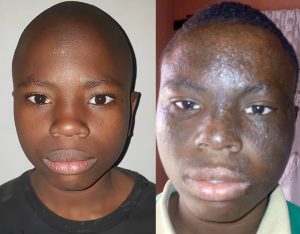
Before and after photos of Moses.
I look at it as not me being the target. The children are the target. Because there’s nothing they can do to me. They’ve made the children backward. The children were speaking only English as their language of communication. Now they can’t speak English.
I met the older one, who happened to have been burned by fire to a third-degree point. His name is Moses. He is scarred all over his face. He cannot use his hand now to hold a knife because he’s disfigured on both hands by fire. They kept mosquito coil on top of carton under his bed (and he got burned). That’s careless of them.
They were under the custody of the state government and not my custody, and so were supposed to take care of him. And the commissioner for women affairs said it would amount to a waste for her to follow up with physiotherapy. That’s what I learned she said. So, the boy is now deformed, with scars all over his body and the body itches him because they didn’t follow up with physiotherapy.
So generally, it has brought a lot of setbacks even to the whole children. They missed two school years before they put them in school. … The trauma and mental agony, there are so many damages they’ve caused the children.
Your story kind of mirrors the Nigerian situation in a way — the clash of religions. You’re a Nigerian. Why do you think religion triggers such acrimony in Nigeria?
Yeah, it wasn’t like this in the past. In the ’90s, when you visit government parastatals (in Muslim majority north), you will find Christians of different tribes working in different offices but now, even on contract, they don’t take foreigners on contract. It’s only Muslims.
If you are not from Kano, you may be from other states. They use it (religion) as they do in politics. But it’s not all Muslims that have such mindset. Some of them are liberal. I met some of them in prison. Even in prison, in Kano, only two Christians are staff.
Nigerians today are very divided, owing to the fallout of the recent presidential election in the country that many now view from an ethnic or religious lens. This is evident on social media where discussions or opinions assume ethnic or religious dimensions. What do you make of that?
It’s the fault of people who allow themselves to be used. Politicians use people as their means of achieving their goal. Religion is one of the tools they use to divide us. If we actually follow our religion piously as we are taught, there shouldn’t be any violence.
The issue of Bola Tinubu, Peter Obi and Atiku Abubakar (three leading aspirants that contested the Feb. 25 election in Nigeria) boils down to religion. Somebody like Obi, (who placed third, behind Atiku and Tinubu), you will hear some people say that it’s Christians that voted for him. This is the situation and it’s a problem.
Anthony Akaeze is a Nigerian-born freelance journalist who lives in Houston. He covers Africa for BNG.

